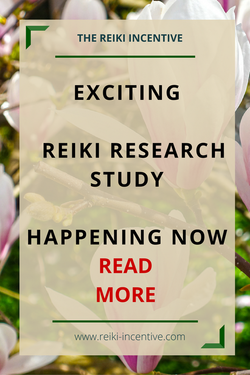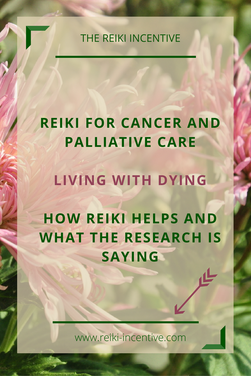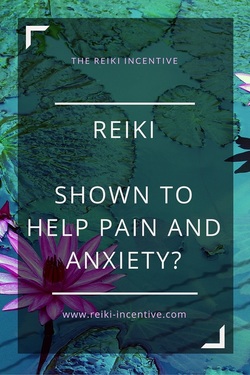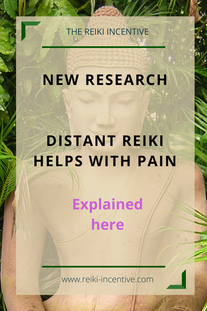|
I’m talking tomorrow briefly in the online Reiki healing summit about how Reiki was so beneficial for me in terms of pain relief when I was unwell with back pain caused by what we call a “slipped” or herniated disc (actually I had three slipped discs, one which required surgery).
In fact it was so helpful to me that it was the turning point which made me take Reiki so much more seriously and make it part of my daily life. Imagine how pleased I was to read the results of some very recent and positive research which looked at Reiki for the pain caused by this condition. Published earlier this year, researchers in Iran compared Reiki to physiotherapy and drug therapy to assess how well each treated the pain and improved patients’ ability to function in daily life. They conducted a clinical trial where they randomised 60 patients into one of three groups:
The study participants had no prior experience of receiving an energy therapy. All groups were judged to be similar in terms of their levels of pain at the start to the trial and in other characteristics. The Reiki group received 3 x 15-minute distant Reiki sessions on three consecutive days. The Physiotherapy group received 7 – 10 sessions of personalised physiotherapy of between 60 and 90 minutes each. The results showed that the Reiki plus medication reduced the severity of back pain and improved the level of activities amongst participants to a greater degree than either physiotherapy with medication or medication alone. The researchers concluded that Reiki is a more cost-effective and faster treatment method than physiotherapy whilst being safe with no known side effects. Wow, this all sounds very positive and encouraging, but it is important to remember that this is only a small trial. Academics appraising this trial would also point out that the trial was not “blinded”. This means that everyone in the group knew what treatment they were receiving - so it is possible that some of the effects felt in the Reiki group were due to positive expectation. No details are given as to how patients were randomised, so we don’t know how effective this was either. But… it is still a good result. What it means for us is that there is yet another small study which again indicates that Reiki may have value for pain relief, however it is not strong enough evidence for us to make claims about pain relief on our websites or other marketing material. We can say however that there is evidence from some small studies which points to the effectiveness of Reiki in the area of pain relief. And of course, we shouldn't fall into the trap of discounting physiotherapy! This is a long standing and proven treatment. It has important benefits, not only in terms of pain relief but also in strengthening muscles, improving condition and reducing the chances of recurring back issues. So Reiki is complementary – it is such a great tool for us to have in our self-care toolbox. It’s something I love using and sharing with others too. How lovely to have another small study to support its value! You can read the full study here: https://www.ncbi.nlm.nih.gov/pmc/articles/PMC5871054/ Reference: Jahantiqu, F et. al. (2018) “Effects of reiki Versus Physiotherapy on Relieving Lower Back Pain and Improving Activities of Daily Living of Patients With Intervertebral Disc Hernia”, Journal of Evidence-Based Integrative Medicine, Vol. 23: 1-5
0 Comments

I was really interested to read recently about what seems to be a very large observational study which is currently being conducted by the Centre for Reiki Research in the US. The purpose of the study is to measure the effectiveness of Reiki sessions in terms of their effect on:
The study began in March 2015 and to date, there are 82 Reiki practitioners involved, all members of the Reiki Membership Association. From what I can understand from the Center for Reiki Research website, it would seem that Reiki recipients are recruited into the study directly by each Reiki practitioner at his or her practice. Both before and after their Reiki sessions, those who participate answer some questions about their symptoms and how they feel, anonymously, by completing an online questionnaire. This practice mirrors some of the larger observational studies I have seen conducted in the health service here in the UK. Part of the data collection involves participants completing a list of questions which make up the PANAS Schedule (Positive and Negative Affect Schedule). This is what is known as a “validated” outcome measure. This means that it has been shown to accurately capture valid information about positive and negative moods. It would seem that the research has had formal independent ethical approval, via Harvard University. As well as being a sign that the research is ethical this usually indicates that it is also likely to be well designed. Many ethics committees will view poorly designed research as unethical. So far, data from over 1200 sessions has been recorded. The study is aiming to gather information from 2000 sessions in total. It is anticipated that the research will be completed some time in early 2017 after which the data will be analysed by PhD qualified Reiki researchers. In March this year, a preliminary analysis of the available data indicated positive results on all the outcomes measured. These positive results were shown to be “statistically significant” which means that the positive results shown in the data were unlikely to be as a result of chance. Great eh! The Center for Reiki Research states: “The results of the study will demonstrate in what way and to what extent Reiki is helpful in the categories studied. This information will be available to practitioners to guide their use of Reiki. It could also be used in the design of future Reiki studies.” It is certainly an exciting study. Its size is a particular strength, as is the fact that some of the data being collected is via the use of a known and validated outcome measure. The anonymous collection of data should help reduce any bias in the results which might have been created by the recipient wishing to please their practitioner. The next step for this research will be for the researchers to thoroughly analyse the data and prepare a report for publication in a reputable “peer reviewed” journal. “Peer review” simply refers to the process that new research papers go through. A written report will be circulated to one or two research experts for comment and questions before the final version is accepted for publication. This ensures that it has been conducted and reported properly. If you would like to know more sign up using the box below. I'll let you know when something new is posted. And don't worry, your email is safe and I won't bother you with anything else. 
Writing about the potential benefits of Reiki in palliative care has been an interesting and enlightening journey. The original focus of this article was to examine the “evidence” for the benefits of Reiki in terms of what is often medically considered to be sound evidence (such as that from randomised controlled trials). I found some of this, but I also found much wider and more profound sources of information and wisdom. Let me share… I was extremely interested to read a piece of qualitative research (1) which explored the lived experience of a group of people living with advanced cancer, or as the authors' put it “living with dying”. Qualitative research is a particular type of research which involves the researcher developing a relationship with the people they are researching and, in this case through discussion and interview, exploring and understanding deeply just what their experience is like for them and what it means to them. When considering how and if Reiki can benefit people facing this, taking a look at what the experience means to people in that situation and what support they might need seemed like the best starting point. Unsurprisingly, the research documented the negative effects of advanced cancer on the emotional well-being of the people in the study. Anxiety, stress and depression were seen in addition to the physical symptoms such as pain, fatigue and discomfort. What the paper also showed was that the participants needed to make sense of their new reality and to adjust to it. Finding meaning in the situation helped to reduce the emotional distress. Facing the reality of dying was seen as an existential threat that prompted the need to reconsider ones relationship with life and with the nature of time itself. There were reports of intense “present moment” experiences. Perhaps the biggest challenge of all, it was also seen to hold the potential, like all challenges in life, to be something which ultimately led to personal growth, peace and enhanced psychological well-being in the time left. Most definitely then an emotional, psychological and spiritual challenge as well as a physical one. Spirituality, in the field of palliative care, has been defined as: “the aspect of humanity that refers to the way individuals seek and express meaning and purpose, and the way they experience their connectedness to the moment, to self, to others, to nature and to the significant or sacred.”(3) In 2014, a report was published which evaluated the benefits of an integrative Reiki service for patients with cancer in an academic medical cancer centre in the US (4). This programme was provided by volunteer Reiki practitioners and had been running since 2008. As part of the its evaluation, data was collected which measured participants' levels of distress, anxiety, pain, depression and fatigue both before and after Reiki. It was reported that patients experienced a 50% or greater reduction in the severity of all these factors. These were reported as being both clinically meaningful and statistically significant. If a result is “statistically significant” this means that statistical tests have shown that the benefits are unlikely to have been caused by chance and are therefore more likely to be real effects of the therapy. An overwhelming majority of the patients in this evaluation stated that they enjoyed the Reiki sessions, found them beneficial, planned to use Reiki again and would recommend it to others. Importantly, the evaluation also collected qualitative data by asking participants an open question where they were free to describe their experiences in their own words. Whilst Reiki practitioners gave out the surveys, they were handed in anonymously to other staff, to avoid the possibility of bias. The written responses (175 of them) were analysed using “content analysis” The descriptions that people gave of their experiences fitted into the following themes: “Relaxation and peace: The most common words used to describe the feelings evoked during a Reiki session were “relaxed,” “relaxation,” and “relaxing.” Patients also expressed feelings of peacefulness, warmth, and calm. Symptom relief: Patients described relief from both psychological and physical symptoms, such as anxiety, stress, fatigue, muscle tension, stiffness, and pain. They often described this relief as being simultaneously psychological and physiological (not distinguishing between mind and body). Physiological response: Several patients wrote about how the Reiki sessions lowered their blood pressure or reduced their heart rate, perhaps a physical indication of the relaxation response. Sense of connection: Some patients wrote about how the Reiki session produced a sense of connection with others (such as deceased relatives) or with their own authentic emotions, prompting a profound feeling of well-being. Positive thinking and sense of healing: There were a number of participants who credited the Reiki sessions with providing a sense of healing and helping them to think positively about their body’s capacity for healing. Freedom and release: A few participants felt that Reiki allowed them to be emotionally vulnerable and to experience a sense of freedom by alleviating the burden of their diagnosis.” I think that these responses show just how deeply healing Reiki can be, on all levels – physical, emotional, mental and spiritual. I am sure we all recognise them and it is wonderful to see them so eloquently articulated in a published study. The authors of the report felt that their evaluation provided good initial evidence of the potential of Reiki to help fulfil the unmet spiritual and physical needs of some cancer patients, by providing an enhanced experience of human connection and caring, promoting deep relaxation, symptom relief as well as enhancing a sense of healing, positivity and connectedness to others and the deeper self. It seems then that there is clearly a match between what some patients facing advanced cancer or palliative care might need and the benefits Reiki can offer. In the UK, NICE guidance (2) on the improvement of supportive palliative care services states that patients should be offered a range of physical, emotional, spiritual and social support in addition to services which enable people to manage the after effects of advanced cancer themselves. In 2010, in light of this, a clinical team in Canada set up a volunteer complementary therapy programme within a 15 bed in-patient palliative care unit north of Toronto (3). Volunteer therapists were recruited in 2010 to provide massage, Reiki and therapeutic touch to patients. The effects of this were evaluated by way of a patient questionnaire which was given after one or two sessions. 86% of patients received complementary therapy interventions and 69% of the sessions had included some level of psycho-spiritual support. The evaluation showed that pain, anxiety, low mood, restlessness and discomfort were all eased whilst inner stillness, peace and comfort were all increased. The volunteer therapists were included in multi-disciplinary team meetings where they could raise concerns about any particular patient who had, for example, expressed emotional, psychological or other distress. Their contributions were respected and valued by the clinical team and the holistic dimension of the therapies was appreciated by patients, clinicians and managers alike. It was reported that the programme was regarded by patients and families as essential. There is certainly a demand for Reiki amongst cancer patients. Reports (3) have stated that up to a third of cancer patients seek out complementary therapy and this demand continues to rise, whilst the attitudes of doctors and others in the medical professions generally are slowly changing from “scepticism and frank antagonism in some cases (3)” more towards cooperation and co-existence. Many in the medical world however seek evidence from clinical trials to back up the effectiveness of a therapy before they will really consider it to be of use. Writing for the American Journal of Hospice and Palliative Medicine in 2015, Ashley Henneghan and Rosa Schnyer (5) completed a focussed literature review which looked for this kind evidence base for the use of energy therapies like Reiki in palliative care. They did not find any published trials which specifically related to palliative care, but there were quite a few papers which looked at the benefits of Reiki and similar energy therapies (Therapeutic Touch and Healing Touch) in relation to some of the specific symptoms which are very relevant to palliative and end of life care. They concluded that the evidence supports the use of energy therapies in relieving pain, improving quality of life and well-being and in reducing symptoms of stress. In 2008, a Cochrane review (6) was published which looked at the value of energy touch therapies for pain relief in adults. It concluded that they reduced pain levels in the trials examined, potentially over and above any placebo element and that Reiki was the most promising energy touch treatment. A more recent systematic review looking specifically at Reiki, conducted in 2014 by Kumar et al. (7) also concluded that Reiki may have value in the management of pain. Also in 2014, a literature review concluded that Reiki holds potential in the reduction of both pain and anxiety, as discussed in my post on 12thMay 2016 (8). Way back in 2003, a small clinical trial (9) was conducted which compared the effects of Reiki in addition to standard medical treatment for patients with advanced cancer against rest with standard treatment. It was a small trial, but it concluded that the addition of Reiki improved both pain control and quality of life for those people who received it, over and above the benefits received by the group who simply rested. In 2011, a larger trial with 118 patients was reported which examined the use of Reiki in a cancer infusion and day centre. Improvements in well-being, relaxation, pain relief, sleep quality and anxiety were shown (10). Whilst this all sounds very positive, it must also be remembered that the trials which have been conducted so far are comparatively small ones, and many are not reported well enough for some to accept as valid. We can say however that there is early indicative research which shows the benefits of Reiki in these areas. There is clearly enough evidence to persuade many cancer centres to introduce services for patients, even if many are still provided by volunteer practitioners. In the UK, NICE guidance³ on the improvement of supportive palliative care services acknowledges that the level of evidence required for complementary therapies which aim to relieve rather than cure does not need to be as stringent as it would be for curative, invasive or pharmcologic treatments. They do encourage those who provide Reiki in cancer and palliative settings to contribute to the evaluation of their effectiveness, much in the way that was done by the two teams mentioned above. It is an ongoing journey for Reiki. More research and evaluation needs to be done, and will be done. I think what my journey has shown me is that we need more than just data from clinical trials to demonstrate just how Reiki helps. Qualitative data which shares peoples lived experiences is vital as well as other forms of research such as case studies and service evaluations. In different ways we are all part of the Reiki journey and there are opportunities to join the conversation and make a difference. But believe me, I totally understand the fears of many Reiki practitioners when it comes to research. Some worry that because the treatment is aimed at the recipients highest good, not at a single measurable outcome that research might not be able to capture the benefit. Others worry that somehow the research might show that Reiki doesn’t work, what then? Have no fear. Research is being done and it is starting to show some positive outcomes. If you would like to know more sign up for updates using the box below. I'll let you know when a new post is published and don't worry, your email address will be quite safe.
References:
1. Willig, C. (2015). "My Bus Is Here": A Phenomenological Exploration of "Living With-Dying". Health Psychology, 34(4), pp. 417-425. doi: 10.1037/hea0000176 ONLINE: http://openaccess.city.ac.uk/11639/ [Last Accessed 21/07/2016]. 2. NICE (2004) Guidance on Cancer Services: Improving Supportive and Palliative Care for Adults with Cancer, The Manual. ONLINE: https://www.nice.org.uk/guidance/csg4/resources/improving-supportive-and-palliative-care-for-adults-with-cancer-773375005 [Last Accessed 21/07/2016]. 3. Berger, L. et al. (2013) A Canadian Experience of Integrating Complementary Therapy in a Hospital Palliative Care Unit. Journal of Palliative Medicine, 16 (10). 4. Fleisher, K.A. et. al. (2014) Integrative Reiki for Cancer Patients: A Programme Evaluation, Integrative Cancer Therapies, Vol. 13(1) 62 –67 5. Henneghan, A. M. & Schyner, R. N. (2015) Biofield Therapies for Symptom Management in Palliative and End-of-Life Care. American Journal of Hospice and Palliative Medicine, vol. 32, no. 1, p. 90-100, 1049-9091 (February 2015). 6. So, P.S. et al. (2012) Touch therapies for pain relief in adults (Review). The Cochrane Library. 2012 Issue 8. 7. Kumar, S.P. et. al. (2014) Efficacy of Therapeutic Touch and Reiki for Pain Relief in Disease Conditions: A Systematic Review, Journal of Psychiatric Nursing, 3 (1) 1 – 40. 8. Thrane, S. & Cohen, S.M. (2014), Effect of Reiki Therapy on Pain and Anxiety in Adults: An In-Depth Literature review of randomized Trials with Effect Size Calculations. Pain Management Nursing, 15(4) pp 897 – 908. 9. Olsen, K. Hansen, J. Michaud, M. (2003) A Phase II Trial of Reiki in the Management of Pain in Advanced Cancer Patients, Journal of Pain and Symptom Management, 26 (5) 10. Birocco, N. et.al. (2011) The Effects of Reiki Therapy on Pain and Anxiety in Patients Attending a Day Oncology and Infusion Services Unit, American Journal of Hospice & Palliative Medicine® 00(0) 1-5 
Hello again and welcome back. I was asked recently about what research studies have been conducted into the benefits of Reiki, and what the results were. Surprisingly, quite a lot of studies have been carried out. Although many of them are small scale studies they are still useful and of course it is still early days in the world of Reiki research. Interestingly repeated studies which have looked at Reiki in relation to pain and anxiety seem to indicate that these are areas where Reiki might well be showing a measurable positive effect. In 2014, a systematic review was published which sought to examine all the trials of Reiki for the relief of pain and anxiety which were published in the year 2000 or later. Although the number of trials found were limited (at least in comparison to trials of conventional treatments), the authors concluded that there is evidence to suggest that Reiki may be effective for reducing pain and symptoms of anxiety.¹ They therefore suggested that further research in the form of larger trials be conducted. These positive results are also supported by an earlier trial which was conducted in 1998 and therefore not included in the review.² A systematic review is a particular piece of research which is conducted using a specific set of rules. Its aim is to systematically seek out all the clinical trials which address a particular question. It then examines each study, assessing the way in which it was conducted, and considers the results of all the trials in order to come to a conclusion about whether a treatment or therapy is effective for that particular condition. In mainstream medicine, a systematic review is considered to be the most persuasive form of evidence. So a positive systematic review which indicates the potential of Reiki is quite a coup. This is a confidence boost. I know quite a few practitioners, particularly newer ones, often feel quite unsure about how Reiki will be perceived by others, or who question how effective they can be. I don’t think this means that as Reiki practitioners we should rush out and start making new claims about Reiki (just yet). As we know, Reiki is holistic and individual. As practitioners we don’t seek to treat individual conditions or symptoms, rather we seek to treat the whole person. We’re not health professionals trained to treat specific conditions (unless of course we’ve qualified to be), but we can claim to offer a supportive complementary holistic approach which can help people to heal in a wider sense and to cope more effectively with whatever they are facing. How great to know that there is also early but indicative research which shows that it also helps with any associated pain and anxiety. There will be more in my next posts, where I'll take a look at Reiki for depression and also Reiki in cancer care. Are you interested in learning more about research into Reiki? Why not sign up for updates using the box below. I'll let you know when I post anything new and your email address will be quite safe.
References:
1. Thrane, S. & Cohen, S.M. (2014), Effect of Reiki Therapy on Pain and Anxiety in Adults: An In-Depth Literature review of randomized Trials with Effect Size Calculations. Pain Management Nursing, 15(4) pp 897 – 908. 2. Dressin,L. J. & Singg, S. (1998), Effects of Reiki on pain and selected affective and personality variables of chronically ill patients. Subtle Energies and Energy Medicine, 9 (1):53-82. |
Author
Angela established the Reiki Incentive for Reiki practitioners who want to see Reiki more widely accepted and to see it reach new people. She enjoys sharing her passion for authentic practice as well as research into the benefits of this wonderful therapy. Archives
May 2018
Categories
All
|


 RSS Feed
RSS Feed
